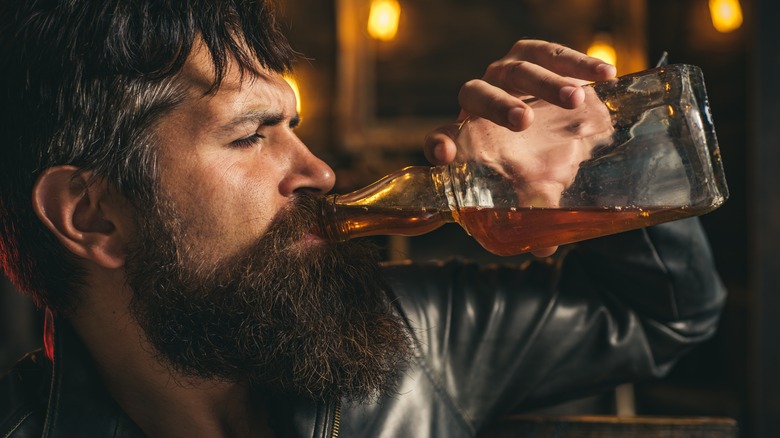Could A Person's Desire To Drink Alcohol Be Driven By Genetics?
Our genes play a role in nearly everything we do and every choice we make. According to Livescience, genetics influences our social preferences, self-control, and decision-making, among other things. But could a person's desire to drink alcohol be driven by genetics? A new study in Alcoholism Clinical & Experimental Research looked at how genetic and environmental factors influenced drinking motives in college students. The study found that genetics influenced alcohol dependence related to coping motives the most, but how much genes affected the other three drinking motives was unclear.
La Trobe University details four primary drinking motives. Social drinking is motivated by pleasure, mainly the desire to increase the amount of fun enjoyed with friends, and is associated with moderate drinking. People may drink to conform in an effort to be accepted by their peers. People who drink to conform often consume less than those who drink for other reasons. Drinking for enhancement is considered a risk-taking motivation and can be driven by impulse. A 2019 study in The American Journal of Drug and Alcohol Abuse found that enhancement motives were the most likely to lead to binge drinking. Lastly, drinkers who use alcohol to cope with feelings or circumstances are more likely to drink heavily and to have alcohol-related problems.
Genetics could partially influence a person's desire to drink
A 2013 study in the Journal of Personality looked at the psychological well-being of 837 sets of twins and found that genetics influenced psychology and attitudes more than the environment they were raised in. If genes can influence traits so heavily, could they influence drinking motives too? Professor Timothy Bates of the University of Edinburgh's School of Philosophy, Psychology and Language Sciences and co-author of the study said that genetics exert the strongest influence on a person's sense of self-control (via the University of Edinburgh). And a 2014 study in the Journal of Studies on Alcohol and Drugs found that the amount of self-control a person has affects how they use alcohol.
Alcohol dependence has been linked to genetics, and the National Institute on Drug Abuse (NIDA) says up to 50% of the risk for alcohol addiction is thought to be genetic. But a 2008 study in the British Journal of Pharmacology suggests that up to 40% of the risk for heavy drinking is influenced by culture, attitudes, stressors, and other environmental factors. So, could a person's desire to drink alcohol be driven by genetics? The research discussed here says yes, at least partially. But it's not the only factor. Who you hang out with, how you deal with stress, and your culture's attitudes around drinking can influence your drinking habits too.


